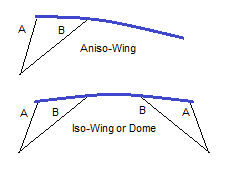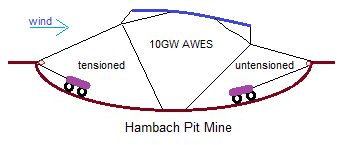iso-dome,
iso-array, iso-lattices,
iso-meshes by kPower
iso-meshes by kPower
- Early forum post 5534 Date: 1/26/2012
- Early forum post 5549
- Early forum post 16414
- Early forum post 16455
- Early forum post 16458
- Early forum post 16517
- Early forum post 16548
- Early forum post 16550
- Early forum post 16552
- Early forum post 16825
- Early forum post 16829
- Early forum post 16830
- Early forum post 18763
- Early forum post 18765
- Early forum post 19529
- Early forum post 19726
- Third small prototype of megascale isotropic kite concept
-
Quasi-Planar Isotropism with Square TarpKites (Kixels)
-
Top Megascaling Principles (especially "stake-out")
-
Isotropic Kite in Persistent Flight
-
Isotropic Kite Demo (Scale "Large-Array" Model)
- v
- v
Send
AWE notes and topic replies to editor@upperwindpower.com
Misc. Iso-Kite Design Notes
Flattening Chord of Dome and Unit-sails- a flatter wing is a hotter wing and B-lines aft of the LE A-lines are the primary means to flatten and minimally power-up a soft aniso-wing, with a stability boost for LE inflation, when tensioned somewhat. The B-line factor is evident in Rogallo's original Flexible Kite design. There are also C and D lines in common use. C lines are usually dispensible, but D lines are essential to SS kite inflation, and are the "brake" lines in multi-line power kites. For a round/polygon iso-dome or unit-sail iso-wing, an inner B-line ring will be standard (and maybe even C-line ring, according to engineering trade-off).

Every unit-sail location in an isodome wants an independent approximately optimal AoA, which passive elastic rigging can enable. The flow-field around the iso-dome will tend to buffer local wind turbulence (ie. atmospheric boundary layer vertical convection). The major engineering trade-off question for unit-sails is the furling and/or hot-swapping design. Possibilities range from vertical surface halyards to workers ranging out on the dome to do sail changes. Specific unit-sail design is project in itself. Proposed that "UFO" is a nice working name for iso-unit-sails, in honor of the original UFO iso-kite.
Based on brilliant online interviews, Pat Goodman of North Technology Group (NTG) has been identified by Kpower as a rare top kite aerodynamics and design expert, and directly invited to collaborate in multi-r iso-kite AWES R&D. There is a generational transition in kite engineering science as older masters like Culp, Lynn, and Roeseler age-out. Goodman will be a fine new mind in AWE. Note NTG's already deep strategic role in AWE R&D, with several DE branches, and the wing designer/supplier (North Sails NZ) for SkySails of Hamburg:
http://www.energykitesystems.net/AirborneWindEnergy/NorthKb.html
Another great interview link to add to archive:
North Kiteboarding Reborn - The Pat Goodman Interview - Kitesurfing Magazine
==================
Schematic Concept coming along nicely:

=======
The
multi-r architecture can be classed as a Playsail Kite, which is
conjectured to be the first kite, dating back to the Paleolithic Age,
when hunter-gathers struggled with skin tents in high wind. The
playsail topology is the most conservative and radical kite type.
Hambach
pit should never be fully flooded, or the pumped hydro capability is
lost and the AWES capability reduced. The AWES should instead keep the
lake pumped out enough to accept new hydropower flow, perhaps from a
higher shallower nearby reservoir.
If
we have a 10GW unit-AWES concept, then ~100 plants is in principle a
civilizational ecological game-changer. Creating a starting list of
promising sites is timely. Hambach Pit, Columbia River Gorge, North San
Francisco Bay, Three Gorges Dam, Isthmus de Tehuantepec, Gibraltar,
etc..